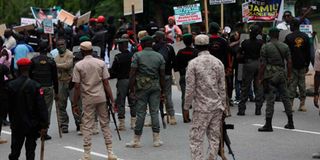Breaking News: At least 10 feared to have drowned in Makueni river
Nigerian celebrities, youths hold protests against police brutality

Nigeria joint security operatives clampdown on protesters during a protest to commemorate one year anniversary of EndSars, a protest movement against police brutality at the Unity Fountain in Abuja, on October 20, 2021.
Many Nigerian celebrities and youths have stormed Abuja and Lagos in memorial processions for those who died on October 20, 2020 during protests against police brutality tagged EndSARS.
The parades organised by celebrities and social media influencers on Wednesday took place in major streets of Abuja and in Lekki Tollgate in Lagos where many people were believed to have been killed by troops during the 2020 protest.
The 2020 countrywide protests against the Special Anti-Robbery Squad (SARS) turned violent, with more than 78 policemen killed, police stations burnt, correctional centres vandalised and inmates set free in Lagos and Benin City.
The protesters wanted authorities to disband the SARS segment of the Nigeria police, which was accused of heavy-handedness, brutality and corruption.
In the memorial protest in Lagos on Wednesday, scores of young Nigerians, alongside celebrities, filled up several cars and buses, blaring horns as they drove through the toll plaza in the early morning.
But while the parade was in progress, officials of the Lagos Neighbourhood Safety Corps (LNSC) passed vehicles to ensure a free flow of traffic.
At the Lekki Tollgate, where the 2020 protests turned violent, police on Wednesday arrested some protesters that they described as miscreants and fired teargas to disperse others.
One of those arrested in Lagos said: “I did not do anything. They beat me, they collected my phone, they took my money; the police have not learnt their lessons.”
As the event continued, the number of youths at the venue grew while others came down from their cars, chanting solidarity songs.
One of the celebrities, Debo Macaroni, said on his Instagram page: “In memory of those who died that day and those we have lost to police brutality, we will: drive through the tollgate from 8-10 am; blast our horns in unison as we drive through and wave our flags.”
“We’re rolling up in cars on Wednesday to drive through the tollgate. We know their way, so a procession of cars is the safest option to minimise police harassment. We will stay in our vehicles throughout.”
Mr Hakeem Odumosu, the commissioner of police in Lagos, cautioned residents, especially the youth, against embarking on any form of protest without the approval of the police.
“If you want to go on vehicular procession, okay. They are not going to stop somewhere, come down somewhere and converge somewhere,” he said.
“I want the criminally minded people to know that the police are up to take care of them.”
Some of the EndSARS protesters took to the streets of Abuja, Nigeria’s political capital, especially at the Unity Fountain, from where they trooped to the streets.
Omoyele Sowore, publisher of Sahara Reporters, was among those who addressed the protesters, who held placards.
Policemen were seen around the protesters who left the park and marched on the streets while heading to the National Assembly.
However, when they got in front of the ministry of justice, policemen formed a barricade and prevented them from marching farther.
Chanting at the top of their voices, the protesters demanded to be given the right of way but the security agents stood their ground.
The police authorities had earlier warned against the protests over the widespread violence recorded last year.
In the aftermath of last year’s protests, the Nigerian government disbanded the special police squad and set up panels of enquiries to look into cases of police brutality.
The panels that sat in most states made many recommendations, including police reforms as well as compensation to victims of brutality.
As the memorial protests continued, the federal government again insisted that protesters were not shot at Lekki Tollgate in Lagos on October 20, 2020.
Lai Mohammed, minister of information, said on October 20, 2021, a year after the incident, that there was no evidence that people were killed.
“Today marks the first anniversary of the phantom massacre at Lekki Tollgate in Lagos, which was the culmination of an otherwise peaceful protest that was later hijacked by hoodlums,” he said.
“At earlier press conferences, I had called the reported massacre at the tollgate the first massacre in the world without blood or bodies. One year later, and despite ample opportunities for the families of those allegedly killed and those alleging a massacre to present evidence, there has been none: no bodies, no families, no convincing evidence, nothing.”
He said that after bandying different figures, Amnesty International finally settled on about 12 people killed while CNN went from 38 people killed to two to just one.





